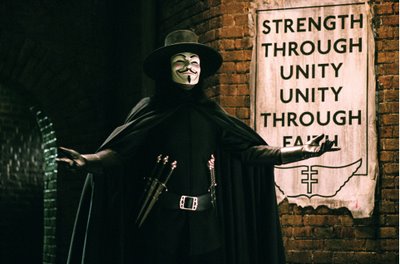
I came home a short time ago from seeing V for Vendetta, a film based on a 1980s story written and illustrated by Alan Moore and David Lloyd. Set in a bleak, relatively near-future where a totalitarian Great Britain has come about due to a governmentally-created and sustained climate of fear. The government's darkest secrets from the dark days when it took power and purged the nation of "undesirables" have been personified and come back to take it down, and he's wearing a Guy Fawkes mask.
I expect that critics will largely pan or dismiss the film, be it out of their own sense of self-importance, the connection to the Wachowski brothers pushing their Matrix buttons, their politics being too Conservative to give the film's message any positive nod or their thin blood leaving them too weak to risk being accused of supporting or allowing any justification for terrorism. The "with us or against us", Right vs Wrong, "our enemies are madmen" attitudes have been with us relentlessly for a few years now and I expect to see that evidenced in many mainstream reviews. Ironically, by doing so such critics only lend credence to some of the film's themes.
The most positive professional reviews, I expect, will dismiss the content as somehow simplistically juvenile and emphasize it as stylish entertainment, bucking a negative line with a thumbs up while leaving themselves off the hook concerning moral issues by simply waving them off as irrelevantly presented by this film. Other than that, I expect shades of "I knew George Orwell, and you, sir, are no George Orwell!" to pervade several of the reviews.
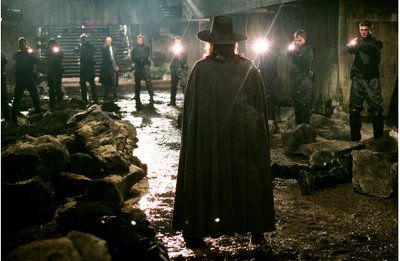
While the film does have its shortcomings - ranging from the lead political figures being as irredeemably corrupt or seemingly two-dimensionally evil, to their forces being incompetent to a degree that's mind-boggling ludicrous as the film draws towards its climax - it was truer to the source material than I'd expected it to be. Consequently, this is set in a Britain that's gone down its own dark path (early rumors had it rewritten into an anlternate timeline where the Nazis had won WWII; I was very pleased to see that wasn't the case), and the stylish V himself is verbose and ostentatious, though he tones that down as the movie proceeds. I'd expected (based on a couple of early reviews I foolishly glanced over) that the government in power and its methods would be more simplistically arch than they were, when in fact the speeches and government-controlled propaganda machine operated more smoothly and artfully than anticipated. I had some momentary concerns that certain security measures were considerably more lax than they should be, but then I realized this was a bully government that, at its core, knew that (prior to V) they had no real enemies to face, only an already weeded and cowed populace to keep constantly afraid and unwilling to ask questions.
 Hugo Weaving plays the lead with panache, though if you're a fan who needs to see his face, then you'll be disappointed. He only appears with his face covered by the mask or in shadow. I want to commend him and/or whoever was responsible for keeping his agent and the studio in check, as in any Hollywood production would find several entities insisting on either a flashback or dream sequence that would allow Hugo to get some face time.
Hugo Weaving plays the lead with panache, though if you're a fan who needs to see his face, then you'll be disappointed. He only appears with his face covered by the mask or in shadow. I want to commend him and/or whoever was responsible for keeping his agent and the studio in check, as in any Hollywood production would find several entities insisting on either a flashback or dream sequence that would allow Hugo to get some face time.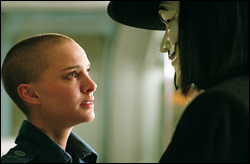 Natalie Portman, as Evey, gets plenty of face time, and spending the latter half of the movie with her head shaved gets to sport a different look. She's effective in the role of a woman unwittingly caught up in the intrigue, though some audience members may have problems with various coincidences that ultimately make her uniquely suited to her place in the story. The screenwriters were likely all too aware of this, which is likely why we're told more than once that there are no coincidences, only the illusion of them. (I'm sure lazy critics looking for Matrix-y elements to enable a reflex dismissal will latch onto bits like that.)
Natalie Portman, as Evey, gets plenty of face time, and spending the latter half of the movie with her head shaved gets to sport a different look. She's effective in the role of a woman unwittingly caught up in the intrigue, though some audience members may have problems with various coincidences that ultimately make her uniquely suited to her place in the story. The screenwriters were likely all too aware of this, which is likely why we're told more than once that there are no coincidences, only the illusion of them. (I'm sure lazy critics looking for Matrix-y elements to enable a reflex dismissal will latch onto bits like that.)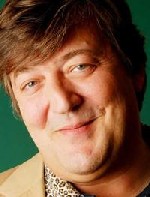 Stephen Fry (seen here on the left) plays the role of Gordon Dietrich, a talk show host who turns out to be a more entertaining and endearing character than he at first seems.
Stephen Fry (seen here on the left) plays the role of Gordon Dietrich, a talk show host who turns out to be a more entertaining and endearing character than he at first seems.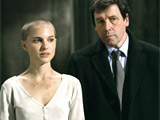 Stephen Rea plays Finch, a very high-ranking member of the police force who is the only moral man sitting in on what are essentially cabinet meetings. An earnest investigator who follows the leads despite their leading back to the government he's serving, he makes the most of the part and helps keep it from being simply a plot device for revealing the country's dark past on behalf of the audience. Here he's seen, late in the film, with Natalie Portman.
Stephen Rea plays Finch, a very high-ranking member of the police force who is the only moral man sitting in on what are essentially cabinet meetings. An earnest investigator who follows the leads despite their leading back to the government he's serving, he makes the most of the part and helps keep it from being simply a plot device for revealing the country's dark past on behalf of the audience. Here he's seen, late in the film, with Natalie Portman.John Hurt plays Chancellor Adam Sutler, the big cheese who appears in most scenes as an obviously Big Brotherish presence on television screens and a small theater-sized screen at shadow cabinet meetings.
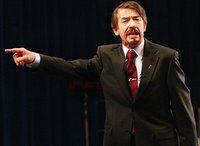 The presentation is an obvious nod to both Orwell's 1984 and to the irony of having Hurt having played the part of Winston Smith in the film, a man who suffered at the cold hands of just such a system. Fifteen years ago I might have waved off many aspects of the red-faced, nearly foaming, stentorian delivery as unrealistically over the top, but having seen the rise of right wing talk radio and television it's all too entirely believable. An uncompromising extremist, like all of the most dangerous men in human history he's a man of faith who is unswervingly devoted to his vision of the world and doesn't pause for a blink to wonder if the end justifies the means.
The presentation is an obvious nod to both Orwell's 1984 and to the irony of having Hurt having played the part of Winston Smith in the film, a man who suffered at the cold hands of just such a system. Fifteen years ago I might have waved off many aspects of the red-faced, nearly foaming, stentorian delivery as unrealistically over the top, but having seen the rise of right wing talk radio and television it's all too entirely believable. An uncompromising extremist, like all of the most dangerous men in human history he's a man of faith who is unswervingly devoted to his vision of the world and doesn't pause for a blink to wonder if the end justifies the means.I don't mean by any of this to imply that the title character is presented as some paragon of morality. It's not worth the attempt to deny that he's largely driven by revenge, and in the pursuit of that and the higher goal of nudging the people to retake their freedom some people are killed either directly or by being used as decoys who are simply doing their jobs. The best one can say is that as the film winds to its close it's arguable that the weight of his actions are weighing on him, too.
An entertaining, visually stylish film, it's worth seeing and should lead to some discussions unless the people you see it with are either already politically polarized into immobility or have been numbed by these modern times into not questioning anything. Not a must-see, but one I was looking forward to for a year (it was originally supposed to premiere this past November, within 24 hours of the 400th anniversary of Guy Fawkes' attempt to blow up Parliament.
Despite all of the above, the film is in the end upbeat and hopeful.
The film earned its R rating via violence, possibly minor nudity, and while there's no sex, depending upon how one counts such things there's more than one attempted rape and some related, threatening language, so keep that in mind when gauging suitability.
So... have you seen it? Agree? Disagree? I've left many elements out - this was going on long enough - and maybe there are aspects you feel deserve more attention, from other performances to all of the future history digs at the U.S.? Sometimes I'm too close to these things -- it's just occurred to me that I didn't think to mention that the guy's a superhuman combatant and killing machine.



Comments
It wasn't a terrible film, but it wasn't the tour de force I expected, either.
Watching the credits at the end... I don't know. Maybe I blinked. But I didn't see a single mention of Alan Moore's name. If I just missed it as it went by, well, fine. If I didn't, though, it begs a few questions... did Moore see a script or rough cut of the film and request that his name not be used on it? I did clearly see a credit for David Lloyd, but none for Moore... that, in and of itself, I found more interesting than the rest of the film.
Oh, and I know many people will be charmed by the Benny Hill homage, but I've never liked Benny Hill, and in fact, the moment when the secret police show up and beat the living bejesus out of the Benny Hill stand in really resonated with me. If only someone would do this to Martin Lawrence, too...
I thought it worked fine and didn't feel as if V, Finch or Dietrich in particular were particularly two dimensional. Characters seemed adequately fleshed out. "Tedious" isn't a word I would have brought anywhere near this, though elements did mesh in a fashion that can be seen as either reflecting poorly on a screenwriter's sense of delivering surprises or being consistent with a vision of everything having a purpose. In that respect it's like watching a Shyamalan movie because his underlying theme is just that - everything and everyone is part of a greater design, or at least serves a purpose.
So long as I don't find myself bored or flatly insulted - so long as I'm sufficiently enjoying the film - I don't find myself trying to anticipate where he's going and exactly how things will turn out. Sometimes it'll happen, but generally that's a sign that I've been bumped out of the story somehow. Generally, I'm there to be entertained; I wasn't paid to be the screenwriter or director, and I can always see how I'd do it better later.
The Benny Hill hommage bit of slapstick I took to be as much a reflection on the lowbrow state of a nation that had been under such a heel for so long. They weren't up to anything sophisticated, and slapstick antics were also more likely to be survived as Dietrich expected (though he was wrong) to do. I suspect the Brits will be more bothered about that than anyone else, though, as most of the ones I've met tend to shade their eyes, look away, or pretend to be from somewhere else when someone brings up Benny Hill.
I meant to mention the bit about Moore and the credits as I was watching for that at the end, too. It only said it was based on a story/graphic novel illustrated by David Lloyd. I haven't dug around to find out if this was a Moore-directed removal or if it was another of those writer's guild bits of nonsense that make any writing credit for a project that's passed through multiple hands over the course of years into such a labyrinth.
As I understand it, Moore took his name off the film after Joel Silver touted the flick as being "from the makers of the Matrix trilogy", Moore requested a retraction/apology, and none came. Moore never cared for film versions of his work (or DC) so he requested his name be taken off from here on.
As for Rea... what else was he to do and remain a character worth following? If not him, then someone else would have had to lead us through many of the details. It could have degenerated into endless exposition from V himself, filling Evey in on all of the history and connections.
Ah, well. Different strokes and all that.
Did you see it solo or with someone, Tony?
I very much enjoyed the character of Gordon Dietrich, and while I'm not exactly a Benny Hill afficionado, I got a kick out of how he handled his message and, as you say, in a way that would appeal to the audience he had.
My big question was why Finch's partner felt like he could trust him when Finch started questioning the system and the role of the government in the viral mass-murder. It just seemed to me that as suspicious as everyone seemed to be about each other, and as self-serving as nearly all of the high ranking officials were, it would have been unlikely his partner would have simply accepted this information and not have taken the opportunity to gain a promotion by turning Finch in. I suppose I just didn't see the strong relationship there that would have made that more believable to me.
Otherwise, though, while it wasn't a favorite, I enjoyed it.
Also, I forgot to note that the movie was the first time I noticed that Stephen Fry's nose is bent. You can see it in the picture in your posting.
Alan Moore demanded his name be removed after Silver claimed that Moore was supporting the film project enthusiastically...which turned out not to be the case. Moore insisted upon a retraction, eventually found that such would not be forthcoming from Silver, and the rest, you know.
According to quotes in Heidi MacDonald's interview this past fall(posted on the Beat weblog), Moore doesn't even want his name on the graphic novel that started the ball rolling, as he considers it no longer "his" in any real or legal sense.
The list of people not to go out to a movie with grows... ;)
Specific comments:
Tammy: I'd presumed that Fry and his partner had come to know each other well from their years of working together and that up until now they simply tried to do their jobs. The undercurrent of loathing for the Fingermen was present in both of them, but they'd hitherto been spared any situation that caused them to collide stronlgly with the black bag portion of the government. Up until then the security branch of the government was just an annoying group that technically outranked them and made their job difficult at times when potential witnesses and suspects were disappeared. Also, they likely worked well together because his partner/trusted associate (Fry appeared to be the equivalent of a police commissioner judging by his being present at those "meetings" with the Chancellor) wasn't after his job. Some people do find their niche that way.
Would a separate or expanded scene between them to let us know their emotional and personal states been potentially helpful? Sure. But the movie was already running at 2 hours and 12 minutes, and it really wasn't necessary unless the audience is bent on being adversarial or simply insistent on having it spelled out.
To put it another way, whereas I'd be tough on a writer if such a scene were asent from a novel I'm far more understanding of it in a film (a far more collaborative effort and one linked to time), and in this particular instance it seemed to fit fine without me bringing anything from the original comics story to bear. Honestly, if the second in command was even in the original story I don't recall; I haven't looked at it since the late '80s and while I enjoyed the themes and V himself it wasn't one of my favorite Moore works.
Tony: Thanks for the clarification. As for Fry's nose it was one of the few distractions - something to momentarily pull me out of the flow of the story - I had in the film. It's tough to imagine having a conversation with the man and maintaining eye contact. I suppose it would be much like trying to do the same with Owen Wilson.
Dwight: Excellent! Thanks for the info I was entirely too lazy to dig up. Moore does tend to disassociate himself from anything that has moved beyond his control, though it seems extreme even for him to not want to be associated with something (the graphic novel) that's still as he and Lloyd created it. His distaste for anything to do with DC continues to run strong. (I believe his beefs with Marvel go back even farther, but don't know how strong those are these days.)
I agree that in a time-sensitive media things have to be left that aren't as vital to the story. And it wasn't as if it were eating away at me, it just didn't seem to click like I felt it should have. It would have been more believable to me had I seen more of a relationship. I just didn't. And, at the time, I chalked it up to something that was probably in the original story that I hadn't read. I'm not saying that the foundation wasn't there, just that there were so many more characters within the government that were out for whatever they could get for themselves, it made it hard to just take any of them at face value.
Now I'm off to lick my wounds. ::grumble, grumble:: I'm LOTS of fun to go to the movies with. Ask anyone! So there..;)
And I didn't think you'd take it personally. Just giving you what you deserve!
But of course we know full well how single-minded, corrupt, two-dimensional, incompetent our current batch of leaders are. Snarling little weasles eager to turn on each other, if they thought they could gain a profit from it.
And the public, dulled, stuck in front the tube, watching, watching, watching, and never doing anything...
Until V makes a noise loud enough for them to hear.
Still, while V pulls strings and plays very dangerous games, the people don't really grasp what's going on until a fingerman shoots a little girl in the back.
Finch isn't just going against the bossmen because he's a cliche. He's read the doctor's diary. He's upset that his government was behind something as monstrous as Larkhill. He's working the case, and high government officials keep coming up -- both as corpses and as people with a connection to the terrorist he's trying to find.
The basic message of trying to take back your life, take control of your destiny is something we need to keep hearing. All that our government wants us to do is nothing. Stay at home. Be silent.
Be afraid. And V says that fear is a trap. Get out of it.
Well, hey, X-Men 3 is sure to be a big crowd pleaser. No need to think about it afterwards.
Sheesh.. I can never figure out how to log this damn thing.
Grant -- Judas Goat.